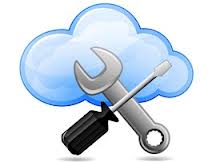 Cloud management tools help businesses to build manage, monitor, tweak and track cloud services. This help companies to save money and make informed strategic decisions. Here we list top 5 most useful cloud management tools.
Cloud management tools help businesses to build manage, monitor, tweak and track cloud services. This help companies to save money and make informed strategic decisions. Here we list top 5 most useful cloud management tools.
1. Cloudability
Cloudability is a cloud management tool that helps you keep your cloud expense under control by monitoring and analyzing the expense you make while purchasing cloud services. You can set budget alerts so that you get notification if your limit exceeds the set budget. It also breaks down the cloud spending and allows you to keep an eye on services which cost you more. It allows you to create various reports that you need from dozens of dimensions and metrics. Cloudability is one of the best applications out there for mismanaging cloud service expense.
2. Dell Boomi
Boomi AtmoSphere allows you to connect any combination of cloud, SaaS, or on-premise applications. The added functionality allows usage of multiple data sources and reservation of cloud resources for real-time data transfer. Dell Boomi AtomSphere platform now handles more than 1 million cloud-managed integration processes per day.
3. MuleSoft
MuleSoft provides widely used integration platform for connecting SaaS and enterprise applications in the cloud and on-premise. Mule ESB leverages mainstream Java development tools like Eclipse, Maven, Spring and Ant which helps in quick deployment. Mule ESB is an open source core and open standards which offers more control.
4. Opscode
The Hosted Chef from Opscode enables you to manage and scale cloud infrastructure with no downtime or interruptions. You can move application form one cloud to another in a seamless way. It also helps you build and deploy new features and improve the overall quality of the software.
5. RightScale
RightScale enables you to manage your cloud infrastructure with a single, integrated solution. RightScale offers configuration, monitoring, automation and governance of cloud computing infrastructure and applications.



